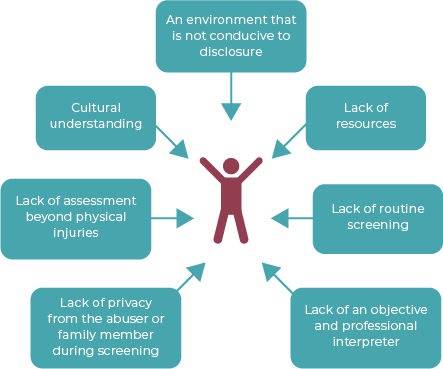Cultural factors hindering disclosure during screening
CALD Family Violence Resource
eCALD Supplementary Resources
“Culture influences how people view abuse: whether they seek help: how they communicate their experience and from whom they are likely to seek assistance.” (Weber & Levin, 2003)
For migrant women in situations of partner abuse, cultural factors such as ostracism from family and community may serve to prevent disclosure.
As well, perceptions of what constitutes violence differ culturally. In some communities verbal and physical violence are not considered abuse. Accordingly, women may not consider themselves the victims of crime, or that they have rights as victims (Lay, 2006). Remember, in any cross cultural encounter, people may be communicating from very different perceptions of what 'reality' is, what is 'good', and what is 'correct' behaviour.
It is important for viewers of this resource to review the VIP core training on how to support partner abuse disclosures.
System Challenges

Creating a partner abuse screening environment that is safe for CALD women
Women who are victims of partner abuse are high users of health services and health professionals are one of the groups to whom women are most likely to disclose abuse. However, health services have difficulty in identifying migrant women who are the victims of partner abuse. Presenting symptoms, especially depression, may be treated without addressing the violence, which is producing those symptoms (Ministry of Women’s Affairs, 2007b). Health professionals play a vital role in protecting women and children. They are vital to women’s access to the criminal justice system, child protection services and other support services.
Some of the case studies in this resource show examples of health services providing critical intervention and support for migrant women (Ministry of Women’s Affairs, 2007a). For example, hospital staff referrals to women’s refuges (see the case study of Lin-Bao, under the East Asian section). Health professionals can provide protection for women from their abusers; for example, by calling in security guards (see the case study of Sonal under the South Asian section).
Health professionals ensure successful screening for migrant women by providing privacy and an interpreter when needed. Health professionals play a vital role in intervention through linking migrant women to specialist agencies in the community.
